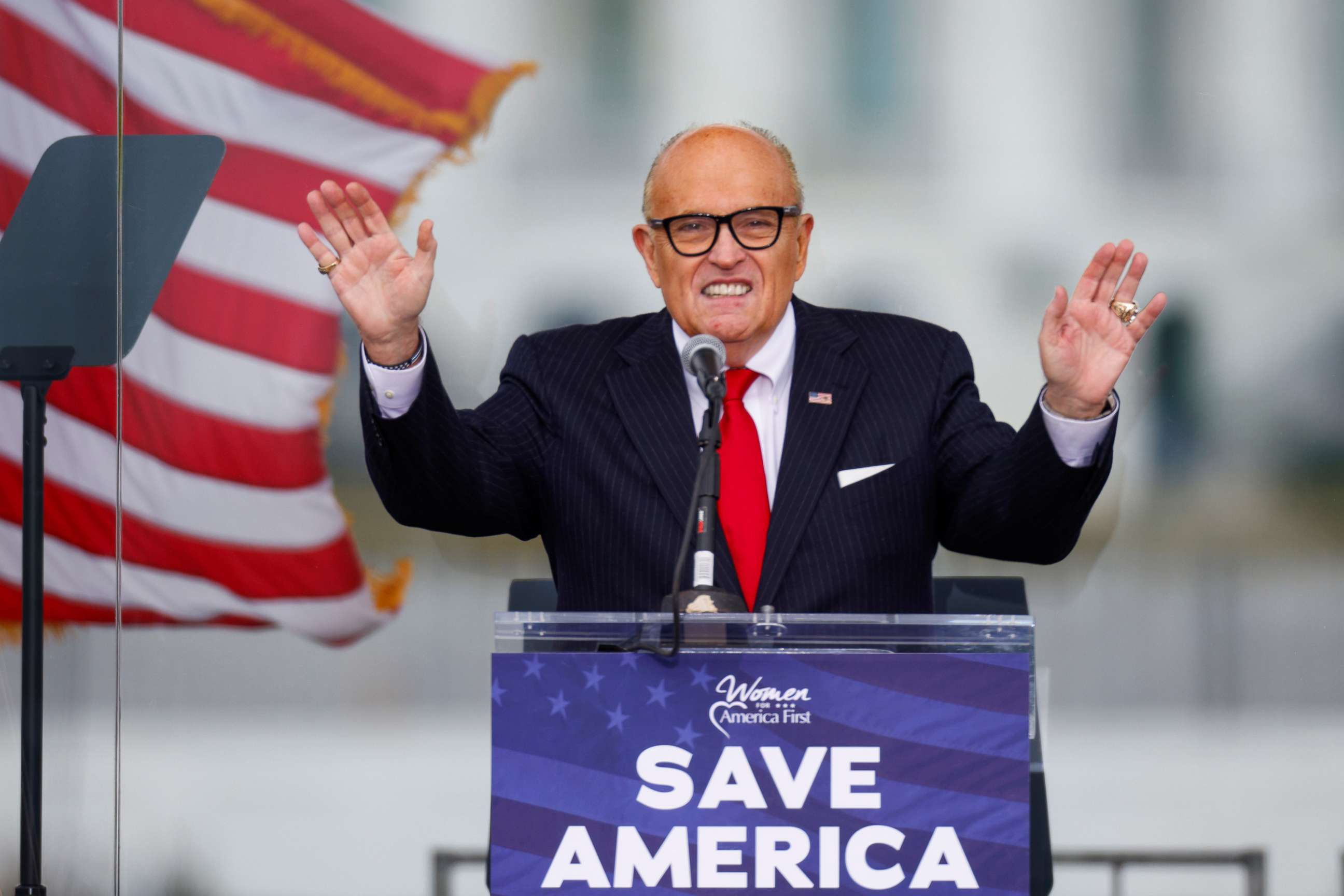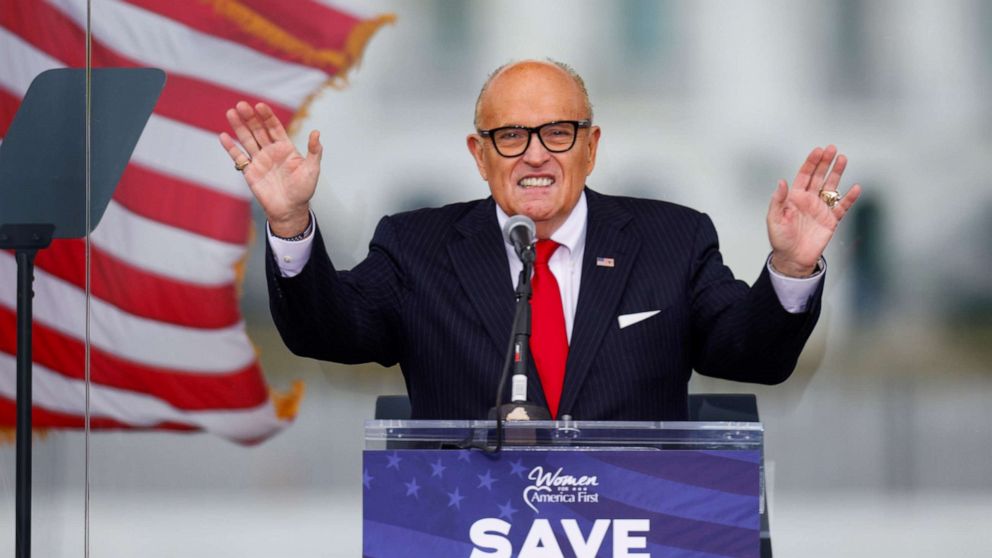Giuliani says he's working on Trump's impeachment defense, would argue voter fraud claims
President Donald Trump's personal attorney Rudy Giuliani tells ABC News he's working as part of the president's defense team in his upcoming second impeachment trial -- and that he's prepared to argue that the president's claims of widespread voter fraud did not constitute incitement to violence because the widely-debunked claims are true.
"I'm involved right now … that's what I'm working on," Giuliani told ABC News Chief White House Correspondent Jonathan Karl.
A few hours later, Giuliani -- who led the president's efforts to overturn the 2020 election results -- was spotted at the White House.
Giuliani's involvement in Trump's impeachment defense comes as many of the lawyers involved in the president's first impeachment, including White House counsel Pat Cipollone and his deputies and outside lawyers Jay Sekulow and Jane and Marty Raskin, do not plan to return for the second trial.
Along with Trump, Giuliani spoke at the Jan. 6 rally ahead of the Capitol attack, where he urged the crowd to engage in "trial by combat." Five people, including a Capitol Police officer, died when pro-Trump supporters marched to the Capitol following the rally and forced their way into the building in an effort to keep members of Congress from certifying the presidential election for president-elect Joe Biden.
Giuliani said there are "different opinions" regarding how the president should approach his second impeachment.
The former New York City mayor said that in his defense of the president, he would introduce allegations of widespread voter fraud that have been raised -- and rejected -- in dozens of courtrooms across the country.
"They basically claimed that anytime [Trump] says voter fraud, voter fraud -- or I do, or anybody else -- we're inciting to violence; that those words are fighting words because it's totally untrue," he said. "Well, if you can prove that it's true, or at least true enough so it's a legitimate viewpoint, then they are no longer fighting words."

In a series of court cases following the election, Giuliani and pro-Trump attorney Sidney Powell alleged, unsuccessfully, that an array of forces from voting machine manufacturers to poll workers had plotted to steal the election from Trump despite Biden's victory in the Electoral College as well as the popular vote.
Regarding impeachment, Giuliani also said that he personally believed Trump should move to dismiss the trial outright.
"If they decide to bring it to a trial, he should move to dismiss the impeachment as entirely illegal. That it was the only impeachment ever done in what, two days, three days," Giuliani told ABC News. "We would say to the court, 'You are now permitting in the future, basically in two days, the Congress can just impeach on anything they want to."
In an historic move last week, the House of Representatives voted to impeach Trump, with all Democrats along with 10 Republican members voting to charge the president with inciting supporters to storm the U.S. Capitol.
"The president of the United States incited this insurrection, this armed rebellion, against our common country. He must go," House Speaker Nancy Pelosi, D-Calif., said on the House floor. "He is a clear and present danger to the nation that we all love."
Rep. Liz Cheney, the No. 3 Republican in House leadership, was among the 10 Republicans who voted to charge the president. Cheney issued a scathing statement condemning the president's actions ahead of the vote, writing, "The president of the United States summoned this mob, assembled the mob, and lit the flame of this attack. Everything that followed was his doing. None of this would have happened without the president."
Giuliani dismissed the validity of the single article of impeachment accusing Trump of inciting violence against the government on the grounds that the president's rally speech did not incite the riot because there was a delay between the speech and the attack.
"Basically, if [incitement] is going to happen, it's got to happen right away," he said. "You'd have to have people running out, you'd have to have people running out of that frozen speech, right up to the Capitol. And that's basically, incitement," Giuliani said.
If the effort to dismiss the impeachment article fails, which is likely, Giuliani said he wouldn't rule out the president testifying. Trump's lawyers were opposed to him testifying during his first impeachment trial, but Giuliani says this situation is different and the impeachment defense is "much more straightforward."
"You always make that decision at the last minute," Giuliani said. "As a lawyer, I wouldn't be as strongly opposed to his testifying as I was then."
Sources close to the president had recently told ABC News that Trump had been increasingly irritated with Giuliani and had not been taking his calls, but he now appears still very much involved in the discussions about how to handle the impeachment trial.
One of the big remaining questions about Trump's final days in office is what pardons he may issue and if he will attempt to pardon himself, something Trump has told advisers he would like to do even though no president has ever done so. White House Counsel Pat Cipollone has advised Trump against a self-pardon, in part because he does not think such a pardon would hold up in court, according to sources familiar with the conversations.
Giuliani declined to say what advice he has given the president about pardoning himself, but he told ABC News that his personal opinion is that it's perfectly justified.
"I think any lawyer would have to tell you there's nothing in the Constitution that permits it. There's nothing in the Constitution that prohibits it. The plain language of the Constitution doesn't limit who we can pardon," Giuliani said. "Do I think there's justification for it because of the atmosphere we are in? Practical justification? Absolutely."
Giuliani dismissed concerns of some Trump advisers that a self-pardon would make Trump more vulnerable to future civil lawsuits because it would be seen as an admission of guilt.
"I mean his legal life's gonna be complicated no matter what," Giuliani told ABC News. "Maybe because I'm more of a criminal lawyer than a civil lawyer, I'd much rather have my civil life complicated than my criminal life."




